The hundred year history of the Ralstons in Montana began when S. F. Ralston, Sr. and his wife Mary Gregg Ralston arrived in Highland, Montana, above Virginia City in 1864.
The couple had married in 1857 in Kentucky and left from Independence, Missouri by ox team for Pike's Peak, Colorado in 1859. The Ralstons stayed in Colorado for four years, venturing on to Florence, Idaho in 1863. The gold rush was over by the time they got there, so they spent the winter and headed for Alder Gulch in Montana. They arrived in Highland, Montana on July 4, 1864. The Ralstons moved on from gulch to gulch, first to Alder Gulch, then to Last Chance Gulch in 1865 and then to Nelson Gulch, Lincoln Gulch and eventually Silver City. They lived in Helena, where SFR Sr opened a meat market and livery stable and finally entered the cattle business, starting a ranch in the Prickly Pear Valley.
Mary Ralston's family, the Greggs, had come from Kentucky, via Illinois, to Missouri in 1812. The couple's son, Jacob, became a sheriff in Independence, and later traveled as a trader on the Santa Fe Trail to the Spanish settlement of Santa Fe. His younger brother, Josiah followed in his footsteps, writing the American classic, Commerce of the Prairies.
Jacob married Nancy and they had six children, five sons and a daughter, Mary. The sons all fought in the Civil War. Mary's brother, Riley, was killed in the war, but Louis, Frank, Josiah and Will all survived.
Jacob and Nancy Lewis Gregg's son William was born on February 8, 1838. As an adult, Captain William Henry Gregg, served under Confederate guerrilla leader William Quantrill from December, 1861 through 1864. He rode with his brother Frank and with Jesse and Frank James and Cole and Jim Younger during the war. He was a key soldier in the raid on Lawrence, Kansas of August 21, 1863. Quantrill gave Captain Gregg a rear guard of sixty men during the sack of Lawrence. His sister, Mary Gregg Ralston, would live until 1912, extolling the virtues of the Confederacy. Her bother Frank Gregg survived the Civil War and settled in Independence Missouri. Her brother William, the Captain, became a prominent farmer and deputy sheriff in Jackson County, Missouri. He wrote a manuscript about Jesse James and was pall bearer to both John and Cole Younger. Captain William Gregg died on April 22, 1916.
Captain Will Gregg wrote A Little Dab of History Without Embellishment, a memoir written in 1906 about his days with Quantrill.
Will Foster ran the SFR store in Bynum, where the Ralstons had a ranch.
The six sons of SFR Sr. and Marry Gregg were:
Frank Jr. "The most moral of the siblings.
Jake, murdered. J. K. Ralston: Jake "could ride anything that would stay on its feet."
William Riley, father of Ken Ralston
Jose, pronounced Josey.
Jim
Harry, the youngest.
The five daughters were:
Minny, the oldest. J. K. Ralston: "Hell of a fine gal."
Jenny
Stella
Lou
Lizzie, the youngest.
S. F. Ralston, Jr, born in the Territory of Montana in 1864 lived throughout the industrial revolution on through the inventions of the telephone, electricity, automobile, airplanes, motion pictures, radio and television. H died in southern California in 1954. He was a true Montana pioneer from a family of pioneers. He was a rancher, deputy sheriff, game warden, Montana state senator, Supervisor of Glacier National Park, road builder and superintendent of the Rockefeller affairs in Seal Harbor, Maine. His brother Will, father of artst, James Kenneth Ralston, was also a rancher. In July of 1932, ill and dying, he wrote younger brother Frank, "The pioneer people were my people and I loved them all. But they are almost gone. Scarce a corporals guard left to carry on. We the children of the early '60's, the second generation of pioneers, will all too soon be but a memory."
Brother Jim was a professional gambler. Harry, the baby of the family, was a poor gambler. Jenny was a teacher in Choteau. Will was a rancher. Jake was murdered. Jose?
Will Ralston, Ken's father wrote a touching letter to his brother Frank, who was living in Seal Harbor Maine. It was July 30, 1932 and he was writing from Broxton, Montana. He was remembering the early days of the family in Montana. He wrote in part,
As I sat pondering time rolled back. I was a boy again in old Helena Town in the 60's. I could hear the rumble of the old Overland six horse coach as they rolled up to the house offices.
I could hear the sharp crack of the whips and the whoa haw-gee of the pioneer freighters as they piloted their wagons and 9 and 10 yoke teams up old Main Street. I could see Mt. Helena cowling behind her foot hills at eve. with now and then twinkle- twinkle of the stars at twilight. Well, after all the pioneer people were my people and I loved them. But they are almost gone- scarce a corporals guard left to carry on. And we the children of the early 60's- the second generation of pioneers will all too soon be but a memory of the yester years- a tribute to a people and a time that can never return. I am old Frank, older than my years and I am tired and it must soon be me for the House Ranch on Peaceful Creek across the Great Divide.
Mary went wherever her husband went. The ranch in Bynum had a couple of hundred head of horses and 50 to 60 sheep and cows. J. K. "Ken" Ralston said they were not particularly a close family. Frank junior was the most moral of them, he said. S. F. Ralston, Sr. died of cancer of the liver. He and Mary both died around 1912 and are buried next to each other just outside of Helena.
When S. F. Ralston Senior died in 1905, Joseph Oker wrote of him in the Montanian newspaper: I first met Mr. Ralston in Marysville in 1886. He was then an active advocate of the secret ballot system. In. December of 1888, just prior to the convening of the 16th territorial legislature, a meeting was held at Helena to take up the question of bringing the matter before the coming session." "in October of the same year, a state election was held under the provisions of the new law, thus making Montana the first state in the Union voting the secret ballot." He also quoted Mr. Ralston, saying"my mother taught me to believe that chattel slavery was a divine institution. That i was sanctioned by the good book, protected by the law, and had the prestige of time back o it. While I have all the respect cor my mother that any man has for his mother, nevertheless, mother taught me that which is erroneous."
The Ralstons had a ranch in Prickly Pear Valley in 1877, with about 800 head of cattle. They sold 1,350 head six years later. In 1903, SFR was running the ranch. In 1878, he took the cattle to the Tetons. They had a butcher shop on the ranch in Helena. Also a livery stable; Also had a house in Helena. On main street, livery stable near the Montana Club. Maybe four blocks.
Marysville, about 22 miles northwest of Helena, was named after Mary Ralston by it's leading citizen, Tommy Cruz, who owned the silver and gold producing mine, the Drumlummon. The town, or village near the mine, which was at the headwaters of Silver Creek, had about 75 houses and six hotels, a restaurant, two saloons and a hardware store in the late 1870's. By the mid to late 1880's, Marysville had grown to about 1,200 and now had churches, schools and more saloons. It was connected to the outside world by a branch line of the Northern Pacific Railroad. By 1892, Marysville had about 2,200 citizens.
Mary, formally Mary Gregg of Missouri, was the granddaughter of Jacob Gregg, the brother of Josiah Gregg, who was the author of Commerce of the Prairie. Mary had five brothers who fought in the Civil War for the Confederacy. Four rode with Quantrill's Raiders. Captain Will Gregg, Louis, Frank and Josiah all survived. One brother, Riley, was killed in the war.
Ralston Ranch, Bynum
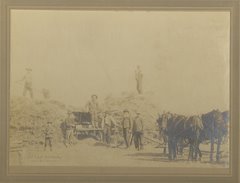
Left to right: Unk,, Dave Cooper (boy), Unk, Yeager, Charlie Cooper, SFR Sr, Yeager, Unk.
Marysville
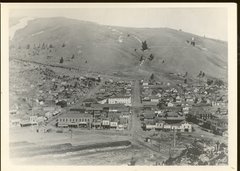
1930's
Four Generations
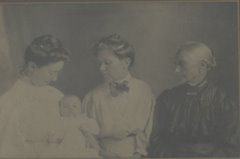
Baby Ralston, Mabel Smith Ralston, Clara Galer Smith, Lucinda Terrell Galer
Benjamin Smith Family
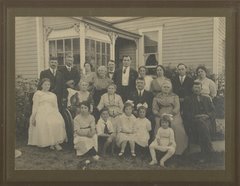
Top: second from left, Ben, 3rd from right, Mabel; Second Row, in wheel chair, Clara; Bottom Row, far left, Dorothy, middle, Grace
Foster Family
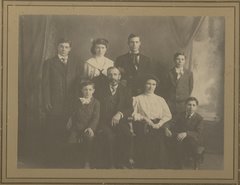
Top, L~R:Max, Mary, Warren,Jesse. Bottom, L to R: Jack, Will, Minnie (nee' Ralston), Harry
Mabel Smith & Daisy Meredith

Montana to Hollywood in 50 Years
Frank and Grace and Dot
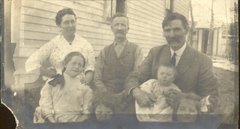
Aunt Queen, Clara, Grace, Ben

Custer's Last Stand
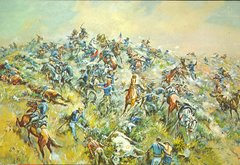
Painting by J. K. Ralston
Pen & Ink Sketch
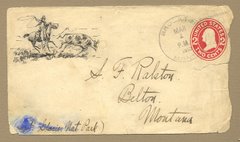
J. K. Ralston, 1915
Teenage Grace
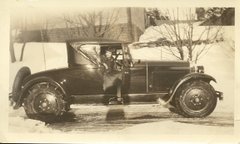
State of Maine
Dorothy, Frank, Mabel, Grace

...and others
Stephen, Poppy, Gruck
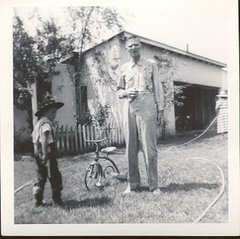
4210 Chandler Blvd, Burbank























